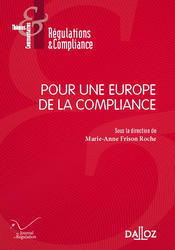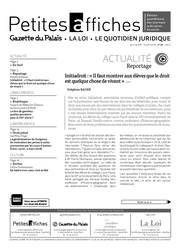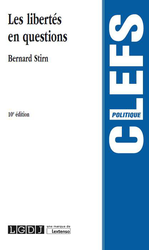
Feb. 5, 2025
Publications

🌐follow Marie-Anne Frison-Roche sur LinkedIn
🌐subscribe to the Newsletter MAFR Regulation, Compliance, Law
🌐subscribe to the Video Newsletter MAFR Surplomb
____
 ► Full Reference: M.-A. Frison-Roche, Who is responsible for making the Compliance provision effective? Is it the company or the public authority? Example of data: CE, 27 January 2025, B. c/ CNIL, Working Paper, February 2025.
► Full Reference: M.-A. Frison-Roche, Who is responsible for making the Compliance provision effective? Is it the company or the public authority? Example of data: CE, 27 January 2025, B. c/ CNIL, Working Paper, February 2025.
____
🎤 This Working Paper was developed as a basis for the Overhang👁 video on 8 February 2025 : click HERE (in French)
____
🎬🎬🎬In the collection of the Overhangs👁 It falls into the News category.
►Watch the complete collection of the Overhangs👁 : click HERE
____
► Summary of this Working Paper: In its decision of 27 January 2025, B. v CNIL, the French Administrative Supreme Court (Conseil d'État ) had to provide a solution to a case that the Compliance rules applicable to data had not expressly provided for. Can a person who believes that another person has failed to fulfill their obligations under the GDPR refer the matter to the French Data Protection Regulator (CNIL) and not the data controller?
The Conseil d'État considers that the question is clear and that there is no point in referring a preliminary question to the ECJ. Indeed, the texts require the person alleging that his or her right has been infringed to first contact the data controller to have the information deleted before subsequently referring the matter to the CNIL. Furthermore, this case involved personal information inserted by doctors in an expert report submitted to a court. The Conseil d'Etat agreed with the CNIL that it was not required to review and assess the evidence, which is the role of the court.
This shows that, while the right to alert can be used to refer cases directly to the administrative authorities, here the specific takes precedence over the general, with the spirit of the Law entrusting the direct preservation of rights to the data controller, with the CNIL's supervisory and sanctioning role coming only at a later stage. This illustrates the more general nature of Compliance Law, which relies primarily on the operators themselves. Furthermore, as a melting pot of various subjective rights, in this case the right to erasure but also the right to contribute to the debates, the Conseil d'Etat stresses that it is the role of the judicial judge to ensure the fairness of the debates.
____
🔓read the developments below⤵️
Updated: Jan. 14, 2021 (Initial publication: Dec. 14, 2020)
Conferences

► Full Reference : Frison-Roche, M.-A., The Economic Attractiveness of Impartiality ("L'attractivité économique de l'impartialité"), in ""Economic Attractiveness, Judge Office and Impartiality. Thinking the judge Office" ("L'attractivité économique, l'office du juge et l'impartialité. Penser l'office du juge"),
____
🎥 watch the conference (in French with English subtitles)
____
📝 read the colloquium program ( in French)
📝 see the general program of the cycle on the Judge Office.
____
📝 read François Ancel's article of 14th of January 2021 in the Receuil Dalloz and which report this colloquium (in French)
📝 read the Working Paper, basis of this conference.
This Working Paper is significantly different from the conference because it was conceived befor the colloquia cycle beginning. In addition, since this manifestation was a Round Table, the conference has taken more into account previous conferences and what said the other two speakers.
📊 see the slides, basis of the conference (in French)
The slides could not be shown during the conference. Orally, it was appropriate to more develop the introductory remarks for emphasizing the human and unique dimension of the Judge Office, expected in economic matters. As a result, the second part of the conference was not given orally, so slides therefore remain the only media available.
____
► Summary of the conference : To fit into the ambition of this general colloquia cycle, which is to "Think the Judge Office" and in this round table which apprehends the imperative of economic attractiveness of this office, firstly emerges the seemingly contradictory relationship between this imperative and the distance that the judge must maintain. Thus it is often asserted that the judge should be internalized at this point in the "places", - an economic concept of great scope (to which the first part of the introduction is devoted, defining the "place" at the same time as a closed and porous space and as a "systemic litigant" -, that he/she should ipso facto lose his/her distance, that is to say his/her impartiality. As places are in competition, even if weighing on one hand the effectiveness of the place, and on the other hand the impartiality of a judge who is external to this place - Judge referring to the Law , Impartiality would necessarily emerge weakened. It would then be necessary on a case-by-case basis to get the judge to give the desired concessions...
The conference aim is to take the opposite position and to state that the Place - in particular because they must be strongly distinguished from the Markets, of which they were the ancestors - require a Judge, who is at the same time "singular", that is to say with a personality, a face, opinions, and in distance so that his/her imagination does not surprise Place. Indeed, these require a human Justice, and a not mechanical one and singular judges, of whom the juge des référés or the arbitrator are the epigone, meets this need. But for reducing their "margins of discretion", how Economy qualifies the Impartiality of a person who can never be neutral, the singular Judge's Office must be inserted into mechanisms reducing these margins. In this way, the Place may reach a Judge who is always more impartial, and in doing so the Place becomes always more attractive.
To achieve this in practice, the place expresses two legitimate expectations, as a "systemic litigant", whose satisfaction increases and the singular Judge's Impartiality and increases the Attractiveness of the Place as a space. This clearly shows that the Place's Attractiveness and the Judge's Impartiality, because judges are inserted into procedures, into institutions and into a "jurisdictional family", are not only not contradictory, but are on the contrary convergent, one fueling the other.
Concretely, and judicial practice shows it, it is necessary to consolidate the particular Judge's Impartiality by inserting him/her into collective processes. As it is necessary to promote a radiance of Impartiality by strengthening the "jurisdictional family".
To consolidate the singular Judge's Impartiality by inserting him/her into collective processes, it is necessary to admit without hesitation the subjectivity of the judge, to seek it even. The reduction of the margins of discretion, definition of impartiality, being obtained by the inclusion of the judge in a procedure of which he /her alone is the master but in which he/her is not alone. This has the technical consequence that he/her is himself/herself in an adversarial debate, not only during the proceedings, but also before (in the media), inside the judgment (and the decision of the Criminal Chamber of 25 November 2020 is a model of that) and after the judgment. By that, the Judge shows that by his/her office he/she is in the future, as climate justice will show. In addition, to limit his/her margins of discretion, the singular judge must fit into a rational principle of coherence, vertical and horizontal. Vertical coherence, because he/she integrates what it is said and the technique of the "determining opinion" is to be encouraged, the singular judge having to avoid it only if he/she has "strong reasons" to do it. This is to follow this general rule Comply or Explain (which is the very opposite of blind obedience). Horizontal coherence, because the singular judge either sticks to what he/she said, estoppel also being a rule of logic. But above all, the institution must extract as much as possible from " institutional doctrines", by all means, of which the annual reports are an example.
To consolidate the singular Judge's Impartiality by strengthening the notion and reality of the "Jurisdictional Family", it is necessary to have of it a broader conception, which could lead to "guidelines" common to various jurisdictions, and a stronger one, by integrating those surrounding the judge to lead to judgment. In this, the procedure before the Court of Justice of the European Union, working on a common file, is a model. If this community were even stronger, the Judge Office would be even more useful than it is already in the digital space.
Thus, Judges who are always human, always diverse, always singular, who listen, consider and adjust to the situation, who within a Jurisdictional Family fit into an Institutional Doctrine which transcends and supports them but which they transform if there is a strong reason to do so, a reason always expressed said: this is the embodied Impartiality that makes an economic and financial Place attractive.
________
May 29, 2019
Editorial responsibilities : Direction of the collection "Regulations & Compliance", JoRC & Dalloz

♾️ follow Marie-Anne Frison-Roche on LinkedIn
♾️ subscribe to the Newsletter MAFR Regulation, Compliance, Law
____
► Full Reference: M.-A. Frison-Roche (ed.), Pour une Europe de la Compliance (For the Europe of the Compliance), series "Régulations & Compliance", Dalloz, 2019, 124 p.
____
This volume is the continuation of the books dedicated to Compliance in this collection.
📚Read the other books' presentations of the collection about Compliance:
🕴️M.-A. Frison-Roche (ed.), 📕La juridictionnalisation de la Compliance, 2023
🕴️M.-A. Frison-Roche (ed.), 📕Les Buts Monumentaux de la Compliance, 2022
🕴️M.-A. Frison-Roche (ed.), 📕Les outils de la Compliance, 2021
🕴️N. Borga, 🕴️J.-Cl. Marin &🕴️J.-Ch. Roda (ed.), 📕Compliance : l'Entreprise, le Régulateur et le Juge, 2018
🕴️M.-A. Frison-Roche (ed.), 📕Régulation, Supervision, Compliance, 2017
🕴️M.-A. Frison-Roche (ed.),📕 Internet, espace d'interrégulation, 2016
📚Read the presentations of the other titles of the collection.
____
► General presentation of the book: This book is written in French. The topic is : "For the Europe of the Compliance".
See below its general presentation in English.
The political dimension is intrinsic to the Compliance Law. Indeed, compliance mechanisms consist of internalizing in certains companies the obligation to implement goals of general interest set by Public Authorities. These public bodies control the Ex Ante reorganization that implies for these companies and punish Ex Post the possible structural inadequacy of these compagnies, becoming transparent for this purpose.
This new mode of governance establishes a continuum between Regulation, Supervision, Compliance (book published in 2017) and renew the links between Companies, Regulators and Judges!footnote-1600.
This political dimension must be increased: the Compliance Law of Compliance must today be used to build Europe.
One can observe not only the construction of the European Compliance Law, object-by-object, sector-by-sector, purpose-by-purpose, but also the construction of the European Compliance Law that transcends and unifies them. Becoming independent of American Law and ceasing to be in reaction, even on the defensive, the Compliance Law contributes to the European project, offering it a higher ambition, that Europe can carry and, by this way, can carry the Europe itself, not only to preserve the European economy from corruption or money laundering, but by claiming the protection of nature and human beings.
This is why the book describes the "reasons and objectives" of the Europe of the Compliance, which makes it possible to describe, detect and even predict the ways and means.
____
► Understand the book through the Table of Contents and the summaries of each article:
🕴️M.-A. Frison-Roche, 📝Avant propos
🕴️K. Lenaerts, 📝Le juge de l'Union européenne dans une Europe de la compliance
🕴️M.-A. Frison-Roche, 📝Un droit substantiel de la compliance, appuyé sur la tradition européenne humaniste
I. LES RAISONS ET LES OBJECTIFS D'UNE EUROPE DE LA COMPLIANCE (THE REASONS AND OBJECTIVES OF THE EUROPE OF THE COMPLIANCE)
🕴️X. Musca, 📝Construire une Europe de la compliance en donnant une meilleure place aux entreprises
🕴️P. Vimont, 📝La place de la diplomatie dans l'avancée d'une Europe de la compliance
🕴️P. Sellal, 📝Les vertus de la compliance : une réponse possible aux faiblesses de l'Union européenne ?
🕴️J.-J. Daigre, 📝Compliance, entreprise et Europe
II. LES VOIES ET MOYENS D'UNE EUROPE DE LA COMPLIANCE (THE WAYS AND MEANS OF THE EUROPE OF THE COMPLIANCE)
🕴️J.-Cl. Marin, 📝Quels outils pour la construction du droit de la compliance en Europe ?
🕴️M. Canto-Sperber, 📝La compliance et les définitions traditionnelles de la vertu
🕴️T. Bonneau, 📝Compliance et secteur bancaire et financier en Europe
🕴️C. Duchaine, 📝L'Agence française anticorruption, à l'appui de l'Europe de la compliance
🕴️D. Martin, 📝Les contraintes et les vertus de la compliance
🕴️A. de La Cotardière, 📝Construire une Europe de la compliance lisible pour les entreprises
________
April 12, 2018
Thesaurus : Doctrine

Référence complète : Espace de réflexion éthique de Normandie (EREN), Le don de gamètes : quelles questions pour le XXIe siècle ?, in Petites affiches, Lextenso, avril 2018, pp. 5-9.
Parmi les sujets débattus dans le cadre des États généraux de la bioéthique, l’assistance médicale à la procréation et le don de gamètes soulèvent de nombreuses questions. Un débat organisé à Caen, par l’Espace de réflexion éthique de Normandie, a permis de discuter des enjeux associés à une éventuelle levée de l’anonymat du don et à la possibilité d’accéder à certaines données informatives sur les donneurs de gamètes.
Les étudiants de Sciences-Po peuvent lire l'article via le Drive, dossier "MAFR- Regulation & Compliance"
Nov. 14, 2017
Thesaurus : Doctrine

Référence complète : Stirn, B., Les libertés en questions, coll."Clefs", LGDJ-Lextenso, 10ème édition, 2017, 312 p.
Lire la quatrième de couverture.
Consulter la table des matières.
Updated: July 31, 2013 (Initial publication: Oct. 25, 2011)
Teachings : Les Grandes Questions du Droit, semestre d'automne 2011
